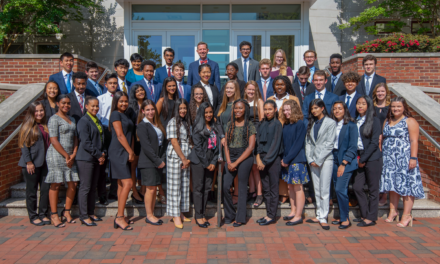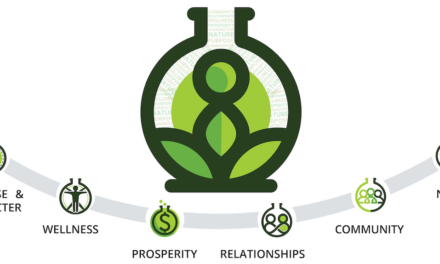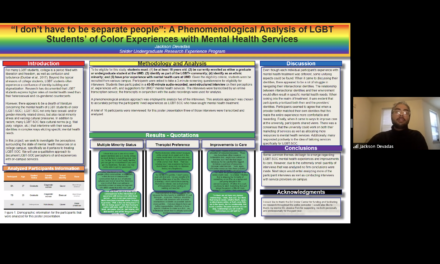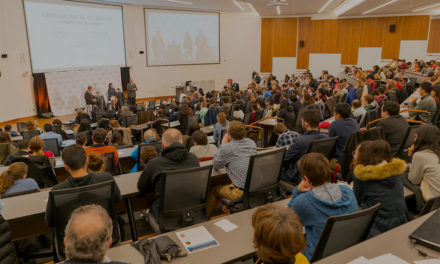Finding A Great Place to Work: Top Performers Surround Themselves with Top Performers
Finding A Great Place to Work: Top Performers Surround Themselves with Top Performers
During a recent BB&T Colloquium on Capitalism, Ethics and Leadership entitled, “How to Find a Great Place to Work and Maximize Your Potential,” Great Place to Work CEO Michael C. Bush and Great Place to Work co-owner Dan Whalen joined moderator and Ed Snider Center Director Rajshree Agarwal on-stage, and offered common-sense solutions and real-world advice for those looking to begin and/or cultivate an enriching career. These talks, known informally as ‘fireside chats,’ are open to the public. This marks the tenth year of BB&Ts generous support of programming and curricula.
The discussion offered solid career advice based on over forty years of combined work experience, and encouraged thinking about the process of business and career development in a creative and honest way: be honest about who you are, and what you want; allow workers the freedom to make mistakes, and solve problems, and recognize that innovation happens when diverse voices are allowed to come together and creatively bring a vision to life. An honest self-accounting was urged, and the duo delivered unvarnished advice and new perspectives:
Why you should want ‘feedback that hurts’
Bad news: nobody wants it, but in order to succeed, you need to be able to give it and to hear it. “We have a whole generation where [every kid gets a trophy],” said Bush. “That’s not life. It doesn’t work like that.” He recommended seeking out feedback, and helping your supervisor by asking specific questions about your performance. It’s the only way that you will improve your performance. Supervisors and other leaders, Bush said, are loathe to provide feedback, but do it they must: “Leaders who want to be liked,” said Bush, “I probably recommend they find something else to do, like get a dog or something. ” He explained that a leader needs to be able to provide clear feedback to workers, even if it’s bad. “Organizations have a mission, they have a purpose…and that transcends any individual in that business, including the leader…the leader has to do things that are very difficult to do…but that’s what great leadership is.” Now, this doesn’t mean that people should be mean; rather they should be clear: “There needs to be an expression of care, and absolute clarity,” emphasized Whalen.
What Michael Bush means when he says he’s ‘sick of’ talking about diversity and inclusion, even though he just wrote a book about it
“Any time you say those words, [diversity and inclusion] you’re going to make someone uncomfortable,” he said. He went on to say that this is an area where research and data is a great tool for companies: “Let the data speak for themselves,” said Bush. People have a hard time recognizing workplace problems anecdotally, but once they get survey data in front of them, that’s when beneficial conversations and real policy change happens. (Bush’s book is entitled, “A Great Place to Work For All: Better for Business, Better for People, Better for the World.”) Whalen added that it’s wrapped up in human potential: by bringing everybody up, not just certain people, you’re maximizing their human potential, which leads to better business, better people, and ultimately a better world.
Why You’ll Have Many Different Careers
Artificial intelligence knows who you are, and knows everything about you. Some people ask if humans will even be necessary in the future. The answer, said Bush and Whalen, is an emphatic yes. Analytics, Bush argued, will enable more personalized benefits packages, such as pet insurance for those who have pets. And these analytics will follow you through your career. Bush acknowledges that while it’s spooky, there are also huge opportunities: humans are the ones creating the programs that track this information, and the algorithms that go into them. By ensuring that there are good, kind and diverse people working in these areas, there is tremendous potential for good. Whalen cautioned that we must also recognize that there are winners and losers whenever a new technology takes over, and it’s important to be empathetic to those who may lose a job due to a technical innovation. Being flexible is important. “Expect to have 3-7 different careers,” said Whalen.
Go ahead: own those mistakes
“We want our leaders to be the best,” Agarwal said. “But what happens to leaders that fail?” Bush answered that they’ve learned a lot about leadership and the lack of leadership, and one of the big things they’ve learned is that leaders are going to make mistakes. “Great leaders admit it. Promptly,” said Bush. “That’s what great leaders do.” He urges leaders to be vulnerable, to tell the whole story, and own up to the fact that, “..you’re a practicing human being, just like everyone else.” But this doesn’t just apply to those in leadership positions; Bush and Whalen are looking for people who can admit when they’ve failed, and talk about how they recovered. It demonstrates that they have grit, and have the integrity to succeed.
‘Cult’ vs. ‘Culture’ in a company
An audience member asked, “Isn’t it dangerous to create a culture in a company that only hires those that conform to the culture? Doesn’t that create groupthink?” Bush pointed out that there is a difference between ‘cult’ and ‘culture’ in a company. “A company’s culture is really, ‘what does it feel like to be here?’” Bush said. “It’s based on the values and purpose of the organization.” But, he emphasized, if you know who you are, you can tell whether or not you’re going to be comfortable there, and ultimately, if you’re going to succeed.
Surround yourself with good people, and you will go far
“Top performers surround themselves with top performers,” Bush said. Lazy people, he said, hang with lazy people. The cohort theory, he maintains, is proven to be true. Agarwal delighted in this: “I love the note that we’re ending with,” she said. “Surround yourself with good people, and you’ll become that much better as a result.”
Lia Kvatum is a freelance writer and producer based in Washington, DC. In addition to the Ed Snider Center, her clients include The National Geographic Society, The Smithsonian Institution, PBS, and the Washington Post. More of her work can be seen at LiaKComms.com.




